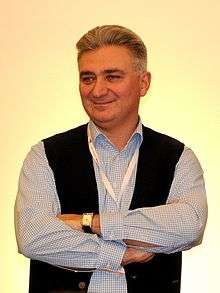Giorgi Giorgadze
Giorgi Giorgadze (Georgian: გიორგი გიორგაძე; born 10 October 1964) is a Georgian chess Grandmaster (GM) (1993), two-times Georgian Chess Championship winner (1982, 1988), Chess Olympiad individual bronze medalist (1996).
| Giorgi Giorgadze | |
|---|---|
 Giorgi Giorgadze in 2013 | |
| Country | Soviet Union Georgia |
| Born | 10 October 1964 |
| Title | Grandmaster (GM) (1993) |
| FIDE rating | 2584 (August 2020) |
| Peak rating | 2625 (July 1997) |
Biography
From the early 1980s, Giorgi Giorgadze was one of the leading Georgian chess players. In 1982 and 1988 he won Georgian Chess Championship.[1] In 1989, Giorgi Giorgadze qualified to the Soviet Chess Championship final tournament, finishing in Odessa in 12th place.[2] In 1997, in Groningen he participated in FIDE World Chess Championship, in which in first round he won Étienne Bacrot and in the second round he lost to Michael Adams.[3] In 2007, in Tbilisi he won bronze medal in Georgian Chess Championship.
Giorgi Giorgadze has participated in international chess tournaments many times, winning or sharing the first places, including in:
- Nałęczów (1989);
- San Sebastián (1991);
- Mondariz – (three times: 1994, 1999, and 2001);
- Ankara (1995, FIDE Zonal tournament);
- A Coruña – (twice: 1995, and 1996);
- Bad Wörishofen (1998);[4]
- Benasque (2002).
Giorgi Giorgadze played for Georgia in the Chess Olympiads:[5]
- In 1992, at fourth board in the 30th Chess Olympiad in Manila (+6, =4, -3),
- In 1994, at fourth board in the 31st Chess Olympiad in Moscow (+5, =5, -2),
- In 1996, at second board in the 32nd Chess Olympiad in Yerevan (+6, =5, -1) and won individual bronze medal,
- In 1998, at second board in the 33rd Chess Olympiad in Elista (+2, =5, -3),
- In 2000, at second board in the 34th Chess Olympiad in Istanbul (+2, =7, -1).
Giorgi Giorgadze played for Georgia in the World Team Chess Championship:[6]
- In 2005, at third board in the 6th World Team Chess Championship in Beer Sheva (+0, =3, -0).
Giorgi Giorgadze played for Georgia in the European Team Chess Championships:[7]
- In 1992, at second board in the 10th European Team Chess Championship in Debrecen (+1, =5, -2),
- In 1997, at second board in the 11th European Team Chess Championship in Pula (+0, =8, -1),
- In 1999, at first board in the 12th European Team Chess Championship in Batumi (+1, =4, -3).
In 1993, he was awarded the FIDE Grandmaster (GM) title.
References
- Championship of Georgia - Tbilisi 1982
- "URS-ch56 Odessa 1989". al20102007.narod.ru.
- "1997 FIDE Knockout Matches : World Chess Championship". www.mark-weeks.com.
- "TeleSchach / Berichte / Woerishofen E". www.teleschach.de.
- "OlimpBase :: Men's Chess Olympiads :: Giorgi Giorgadze". www.olimpbase.org.
- "OlimpBase :: World Team Chess Championship :: Giorgi Giorgadze". www.olimpbase.org.
- "OlimpBase :: European Men's Team Chess Championship :: Giorgi Giorgadze". www.olimpbase.org.
External links
- Giorgi Giorgadze player profile and games at Chessgames.com
- Giorgi Giorgadze chess games at 365Chess.com